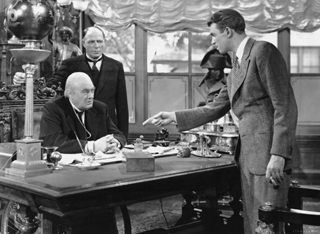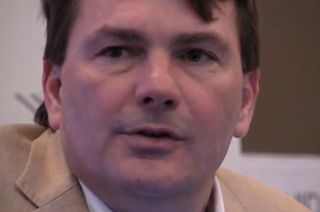Solve the energy AND rare earth crisis: Join the Thorium Bank
 Like Jimmy Stewart’s savings and loan in It’s a Wonderful Life, Jim Kennedy’s Thorium Bank represents the common good.
Like Jimmy Stewart’s savings and loan in It’s a Wonderful Life, Jim Kennedy’s Thorium Bank represents the common good.Put this idea into the “killing two birds with one stone” category.
The “birds” in this case are nothing less than two great economic and environmental challenges facing the West: How to establish carbon-free, sustainable energy independence, and how to cut reliance on China for the rare earth metals vital to products ranging from missiles to mobile phones.
The “stone” is literally a stone - okay, a rock - called monazite.
As I’ve noted before on SmartPlanet, monazite is a mineral rich in rare earth elements, and also in thorium, the element that could replace uranium and usher in a future of safe, efficient nuclear power that helps cut the fossil fuel cord and that greatly reduces nuclear waste hazards including weapons proliferation.
Two problems: Most countries in the West lack policy that supports thorium nuclear. Likewise, countries like the U.S. years ago took measures that handed the rare earth business to China.
Another issue: Although mining monazite in say, the U.S., could help free the country from China’s rare earth shackles, the presence of thorium in the rock discourages such initiative. That’s because - with no federal thorium nuclear approval in place - mildly radioactive thorium is a costly rare earth byproduct that someone has to safely store away.
You would think it’s high time to solve this riddle.
Jim Kennedy’s Thorium Bank to the rescue!
 Kennedy, one of the organizers of the recent Thorium Energy Alliance Conference in Chicago, made a compelling case at the conference for Congress to authorize - but not fund - a “cooperative” responsible for not only taking the thorium off the hands of rare earth mining companies, but also for developing thorium uses and markets, including energy.
Kennedy, one of the organizers of the recent Thorium Energy Alliance Conference in Chicago, made a compelling case at the conference for Congress to authorize - but not fund - a “cooperative” responsible for not only taking the thorium off the hands of rare earth mining companies, but also for developing thorium uses and markets, including energy.You can watch a video of Kennedy making his case below. In it, he describes how he and fellow TEAC organizer John Kutsch have been lobbying Congress - so far unsuccessfully.
Kennedy is a St. Louis consultant who also owns a company called ThREEM3 that owns rights to the rare earth byproducts from Missouri’s Pea Ridge iron ore mine (which would come from monazite at the mine, I believe).
He notes, “As John and I have been trying to convince Congress..you could create a rare earth cooperative that could receive the thorium-baring monazites, and essentially pull out the rare earths, and then take the thorium liability and hand it over to another entity, something we can just simply call the thorium bank.
“And the thorium bank would have a very simple elegant one sentence piece of legislation along with it that says, ‘Congress gives the thorium bank the authority to develop uses and markets for thorium, including energy.’ “
That, he says, would provide “the big tent to develop a thorium energy economy,” and would include Western partners and owners who would participate in the revenue stream and, by the way, create jobs.
Kennedy suggests calling the entity the “Thorium Storage and Industrial Products Corporation.”
He describes it as, “Something to give the public confidence - a federally chartered facility that’s going to accept every single gram of thorium and all the other actinides that are produced.
“That thorium bank would solve the rare earth crisis in the United States in Japan in Korea in Europe. Everyone could participate and own. And own the offtake. Because it would be a co-op. And then you would relegate the risk over to this facility. And this facility would be the big tent where people could come in and either contribute capital or IP.
Kennedy, a firm believer in market forces, recoils at people who have objected to his proposed co-operative as “socialistic.”
“They forgot how the highway system was built, or how we led the world in avionics.”
He points out that the plan put forth by him and Kutsch, “Isn’t askng the government for a dime. We’re just saying give us a pathway so that people can invest intelligently and safely.”
You can return to the main Market News page, or press the Back button on your browser.

